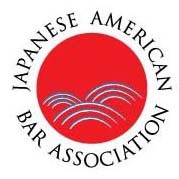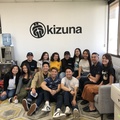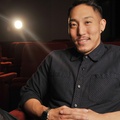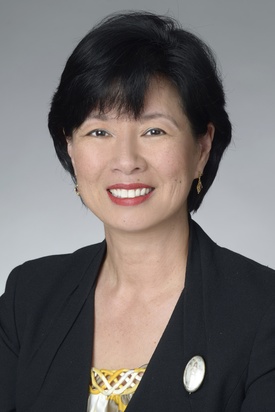
Ambition, motivation, dedication, and determination are just a few words that describe a trailblazing woman like Judge Holly J. Fujie. Growing up in West Oakland did not allow Judge Fujie to have much interaction with the Japanese American community; however her early exposure to a predominantly Black neighborhood gave her the opportunity to appreciate diversity starting from a young age.
During her childhood, Judge Fujie’s interaction with the Japanese American community was limited primarily to church and family; however, she never questioned her identity as a Sansei Japanese American woman. Her roots as a proud Japanese American woman stem from her parents’ and family’s direct experience with the incarceration camps during World War II. Both Judge Fujie’s mother and father experienced camp during their late childhood to young adulthood, but they did not share that trauma with their children until Judge Fujie was an adult. Realizing the hardships and mistreatment caused by the government’s actions on her family and the larger Japanese American community led Judge Fujie to pursue a career in the field of law as an attorney and later as a judge.
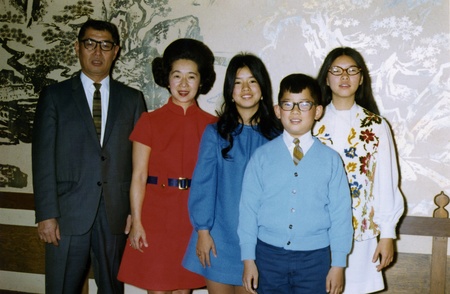
Family, specifically her mother’s, opinions guided Judge Fujie to pursuing a career as a lawyer. Starting at a young age, Judge Fujie showed signs of intelligence and the ability to apply her knowledge. Being a naturally intelligent child in a less educationally developed neighborhood allowed (then) Holly to go through elementary school at a much more accelerated rate than her peers. Holly knew how to read when she entered kindergarten, so her teacher decided to place her in a first-grade class. When she started second grade, her teacher died and the school decided to combine the second and third-grade classes.
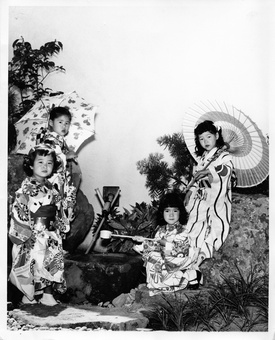
During her Discover Nikkei interview, Judge Fujie stated, she found the third-grade assignments more interesting than her own second-grade work, so she did the third-grade work instead, causing her to be skipped to the fourth grade the next year. After skipping two grades of elementary school, her parents were advised to send Holly and her sister to a different school where the students were primarily Caucasian.
Transferring schools is what Judge Fujie credits for having such wonderful opportunities and educational successes. After completing Claremont Jr. High and Oakland Technical High School, Judge Fujie went to U.C. Berkeley to receive two bachelor’s degrees in three years. Judge Fujie had decided at the age of 14 that she wanted to become a lawyer, so one of her degrees was in Political Science -- the typical major pre-law major -- and her other degree was in Economics, just because it was a subject she found fascinating.
Right after completing her Bachelor’s programs, Judge Fujie began attending U.C. Berkeley Law School at the age of 19, where she met her husband, who happened to be her moot court advisor in her first year. Although Judge Fujie attended U.C. Berkeley for both her undergraduate and her graduate degrees, her experiences in the two programs were completely different. She used her undergraduate years to experience more of the Bay Area, all of its arts, and four different language classes, including Conversational Japanese. Her law school experience, on the other hand, truly opened up opportunities for Judge Fujie to use her identity as a motivation to become a trailblazer for Japanese American women entering the field of law.
Following graduation from law school, Judge Fujie moved to Los Angeles where she became the first Asian American woman to practice at a large law firm in L.A. After working for a few years and becoming a partner at her law firm, Judge Fujie had her first child, Sabrina Hanako, but while she was on maternity leave her law firm dissolved and merged with another large firm. Her law firm assumed that she would not be interested in being a partner at the new law firm; however, that was not Judge Fujie’s plan. After returning to work, Judge Fujie had her second child, Tom and was made the first Asian American partner in her new firm.
After becoming involved with the Japanese American Bar Association and numerous other minority bar associations and mentorship programs, Judge Fujie decided to run to be the first Asian American President of the State Bar of California in 2008.
Judge Fujie credits many other Japanese American attorneys and judges, specifically attorney Gavin Wasserman and Justice Katherine Doi Todd, with giving her the courage to run for State Bar President.
A few years after ending her year as the first Asian American President of the State Bar of California, Judge Fujie decided to apply to the bench and was appointed in 2012. She currently sits on the Los Angeles Superior Court in a civil courtroom at Stanley Mosk Courthouse and is a very well-respected judge.
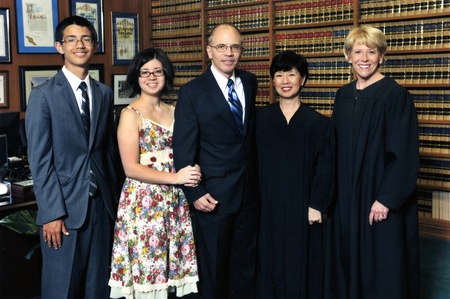
She believes that when attorneys enter her courtroom she should be shown the respect she has earned; however, she also always shows that same respect to those who appear before her. During pre-trial hearings, Judge Fujie is courteous and informs the attorneys about how they must be prepared when they go to trial. Judge Fujie not only works to improve the careers of attorneys and the law community outside of the courtroom, but she also works to improve them inside of her courtroom as well.
Judge Fujie has not always had a trailblazing and smooth-sailing career. When she first became an attorney, and later a judge, she faced adversity due to her cultural background and gender. According to Judge Fujie, the most disappointing part of being a minority partner at a large firm, and eventually a judge, is that people still look at you differently and do not show the same respect as they do for male or white counterparts.
The empowerment of Japanese American colleagues at law school is what gave Judge Fujie the encouragement to become a trailblazer and to realize all the opportunities she had available to her as long as she worked hard to make it happen. Being the first Asian American woman at a large law firm in Los Angeles and then later as the first Asian American President of the State Bar of California has truly spoken volumes of what that inspiration from her colleagues at Berkeley gave Judge Fujie.
Since gaining a large platform from being the State Bar President, Judge Fujie strived to inspire young minority attorneys, especially women. Judge Fujie organized an inspirational and empowering seminar for young women attorneys of a multitude of cultural backgrounds. She also took advantage of all of the open mic speeches she was allowed to give by speaking about hiring and respecting minority attorneys.
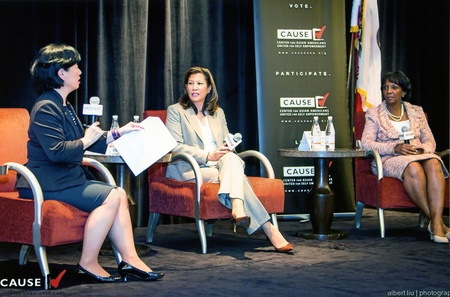
Prior to and after serving as the President of the State Bar of California, Judge Fujie has dedicated countless hours to minority bar associations and mentorship programs. Her dedication to the advancement of minorities in the field of law is truly admirable. Having the title of State Bar President of California allowed her to create programs and help open the eyes of many attorneys and even judges as to why it is important to have a diverse field. Knowing and understanding people’s diverse backgrounds is an important part when trying to represent them in any aspect but especially in law. Being able to communicate and behave in ways that appeal to a client is one of the most important parts of retaining clients, and Judge Fujie emphasized to those who are not of a diverse background that we all need to take time and learn about these different cultural customs.
On top of all that she does in the field of law and the career development of attorneys, Judge Fujie has been able to balance her family life and have a passion for performing arts, food, and antiques. Although Judge Fujie’s life may seem to be consumed by her work and involvement with the legal community, she still manages to make time for the things and people that she loves. This well-balanced and dedicated woman has served as a role model to so many minority and majority groups of attorneys. Judge Fujie has not worked only to encourage minority communities to put themselves out there, but she has also taught some majority groups on how to have a conversation about cultural differences between clients, attorneys, and judges.
Judge Fujie works to provide advice for the community and for minorities entering the professional workforce and taking on greater leadership roles. She believes that it is important for minorities from any professional background to say yes and take advantage of the opportunities that are presented.
She believes that being able to help groups of people to support each other in building careers and confidence has been just as rewarding as being a judge. Judge Fujie urges minorities and women not to let their inner, critical voice hold them back from advancing in life.
She believes that minority-focused organizations are a great way to develop one’s leadership skills in a comfortable setting, but it is when people from these minority groups take leadership roles in mainstream organizations that there is true progress for minorities.
Judge Fujie thanks the people of the Japanese American community – they are the people who have had the largest impact on her life so far. Being of Japanese American descent, the wrongful incarceration of Japanese and Japanese Americans has given Judge Fujie a strong desire to be a part of the legal system in a way in which she can serve justice for all, even for those who are not from the majority culture.
From the people that she has met through her law career to the people of the general Japanese American community, Judge Fujie credits these people for her success and inspiration to continue doing what she has been doing and more: influential legal community members like Dale Minami, Don Tamaki, Judge A. Wallace Tashima, and Justice Katherine Doi Todd played a major role in shaping Judge Fujie into the determined Japanese American female judge and trailblazer that she is today.
Judge Fujie said that every step along the way of her life there have always been Japanese Americans that have been like guardian angels helping her and encouraging her along the way. Although there were not many Japanese/Asian American women in the field of law at the time she began her career, there were always people who were there encouraging Judge Fujie to keep persisting even when she was unsure of herself.
Judge Fujie acknowledges and applauds the Japanese American community for always working toward the advancement of all minority groups. Without the guidance and trailblazing from people like Judge Holly Fujie, the Japanese/Asian American and other minority communities would not be as advanced as they are today.
* * * * *
The Japanese American Bar Association (JABA) Legacy Project creates profiles of prominent jurists, legal legends and leaders in the Japanese American community through written articles and oral histories. In particular, these profiles pay special attention to these pioneering jurists’ reflections on JABA, their distinguished careers, and their involvement in the Japanese American community.
This is one of the main projects completed by The Nikkei Community Internship (NCI) Program intern each summer, which the Japanese American Bar Association and the Japanese American National Museum have co-hosted.
Check out other JABA Legacy Project articles published by past NCI interns:
- Series: Pioneering Jurists in the Nikkei Community by Lawrence Lan (2012)
- Series: Legal Legends in the Nikkei Community by Sean Hamamoto (2013)
- Series: Two Generations of Pioneering Judges in the Nikkei Community by Sakura Kato (2014)
- “Mia Yamamoto—A Leader Who Defined the Nikkei Community” by Matthew Saito (2020)
- “Patricia Kinaga—Attorney, Activist, and Mother Who Has Given a Voice to Those Who Don’t Have One” by Laura Kato (2021)
- “Justice Sabrina McKenna—The First Openly LGBTQ Asian American to Serve on a State Court of Last Resort” by Lana Kobayashi (2022)
© 2019 Kayla Tanaka


